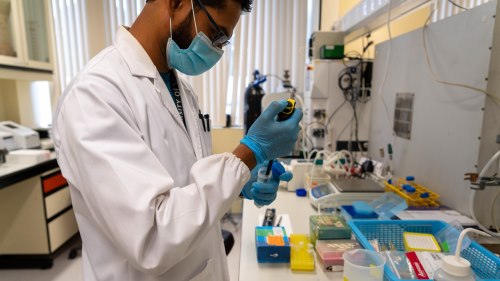

Scientists of National University of Singapore (NUS) have created a new technology to for water cleaning or water purification that is power efficient and also economical. The scientists have synthesised a special protein-mimic that can self-assemble into a pore structure which could be incorporated into a lipid membrane, and the pores permit selective transport of water across the membrane while rejecting salt (ions). These protein-mimics, known as ‘oligourea foldamers’, represent an entirely new class of artificial water channels (AWC) that can be used to improve the energy-efficiency of current methods of industrial water purification.
The Department of Biological Sciences of NUS had created the new water treatment technology in collaboration with the French Centre for Scientific Research (CNRS).
Presently, water purification is done through reverse osmosis (RO) and membrane distillation. RO is a highly energy-intensive process. In light of climate change, there is an impetus to develop more energy-efficient, water-selective membranes for large-scale desalination purposes.
NUS said that its invention represents an excellent contribution to these efforts. It mentions that the relatively high water permeability of the pores formed by these oligourea foldamers suggests that overall energy requirement for water purification can potentially be reduced.
The technological breakthrough
NUS also said that the individual oligourea foldamers are also much smaller in size at just 10 amino acid-residues long – which makes them easier to modify, synthesise, and purify compared to aquaporin or other classes of AWC.
The foldamers are amphiphilic in nature, which means that they possess different charges which allow them to assemble into more complex structures. The complex structures contain pore-like water channels which are further stabilised by strong bonds known as hydrophobic and electrostatic interactions.
According to NUS, these hydrophobic components are clustered on the exterior that allows insertion into lipid membranes. The interior of the pore is more hydrophilic, which allows water molecules to move across the membrane while rejecting ions from passing through. And this is responsible for the selective water permeability across lipid membranes observed in lab tests. The scientists discovered that the oligourea foldamers were similar in function to natural porin-like structures, which makes them viable potential candidates for the fabrication of AWC membranes for water purification.
The foldamers developed by the NUS researchers for water purification were also demonstrated to be more robust compared to other AWCs.
Normal proteins are made up of amino acids joined together by peptide bonds. These peptide bonds are vulnerable to be cut by microbial enzymes that digest proteins, and such microbes exist in unprocessed water. In their research, NUS scientists replaced the peptide bonds with urea bonds, which makes the oligourea foldamers less susceptible to enzymatic and microbial degradation.
Professor Prakash Kumar with NUS Environment Research Institute, said, “The high-water permeability coupled with resistance to proteolytic degradation makes these foldamers excellent candidates for industrial water purification applications.”
In the initial phase, NUS scientists applied the foldamers to a test membrane to demonstrate the water purification capabilities of the self-assembling molecules. For the next phase of research, the team plans to optimise the production of the foldamers and apply them to a larger membrane, before trialling its efficiency in an industrial water purification facility.
In a significant move toward advancing green energy and industrial growth in the state, Himachal…
Golabl chemical conglomerate BASF has announced that its now offering the world’s first biomass-balanced polyethersulfone…
In a crucial stint to bolster the biogas sector and sustainable dairying in the country,…
TotalEnergies SE has received approval to proceed with its Middlebrook solar and battery project in…
Andhra Pradesh Chief Minister Chandrababu Naidu has inaugurated the Rs 1,000-crore green hydrogen plant of…
The BITS Pilani has developed an innovative solution for managing landfill leachate, domestic septage, and…